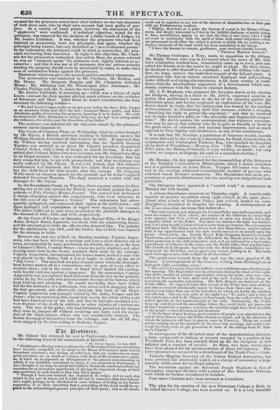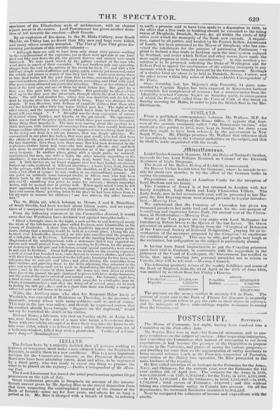The plan for the erection of time new Protestant College
at Bath, to be called Queen's College, has been decided on. It is a very beautiful specimen of the Elizabethan style of architecture, with an elegant s lure tower in the centre. Lord Powerscourt has given another dona- tion of 50!. towards the erection.—Bath Gazette. By an explosion of fire-damp, in the St. Hilda Colliery, near South -Shields, on Friday last, no fewer titan fifty men and boys were killed, and many others severely wounded. The Fort y' Tyne Pilot gives dis- tressing particulars of this terrible calamity-
" Although there are said to have been only about sixty persons working in the neighbourhood of the explosion, yet as there were upwards of one hun- dred and fifty men down the pit, the general distress and anxiety were much increased. We were much struck by the, gallant conduct of the men who
w
went don in search of their comrades. 11 e saw brothers pale slut quivering, stagger from the corf to the outside of the crowd for fresh eis, and with a few hriefand simple words of affection and agony, again, scarcely yet recovered, enter the vehicle and return in search of him they had lost. Carts containing three or four dead bodies left the yard from time to tune; surrounded by groups of agonized mothers, sisters, wives, and daughters,screandng, and blind with grief. One poor woman attracted our particular attention. Three of her cliildre.n.hail been at the fatal spot, mid one of them lay dead before her. 11cr gnel for a
time over this poor little boy was terrible. But gradually we observed her Meal up to the door near the pit-mouth, through which the dead bodies were borne. She still had another boy, whose fate was doubtful, and she left the dead to inquire after hint who might still be living. Hope was stronger than Aespair. It was, therefore, with feelings of exquisite distress that those who
saw her beheld her other little boy borne lifeless past her. The sight of her -utter misery, and the agonizing shriek which burst from her heart, few who heard will ever forget * * * Dreadful was the deep expression of sorrow of devoted wives, funnies, and friends, at the pit onouth. Tho appearance below was as that of the grave itself, over which tho,0 poor mommsrs lamented. Every thing there bespoke it. The men were moving about like spectres in a thick darkness, with indistinct glimmerings from more than usually bedinuned iamps—seldom uttering a word, except in suppressed tones—doing their duties to time dying and dead, in a solemn manner, that was deeply affect We encountered in one place five bottles, that were past recall, who had died from the effects of the gas, and had apparently died plecidly, without one muscle of the face distorted: then there were three more that had been destroyed by the explosion—clothes burnt and torn—the hair singed off—the skin =Hirsh torn away in several places, with nu expression as if the spirit had passed away in agony. In another place, going with a single guide, we suddenly encountered two men, one wait a light, the other bearing something on his shoulders: it was a blackened mas.,—a poor, seal, burnt boy, he was taking out. A little further on, we found waggons that had been loaded, overturned bottom upwards, scattered in different directions ; at horse lying dead, directly in the passage, with his bead turned over his shoulder, as if, inn fulling, he had made a last effort at escape : he was rwollen in an extraordinary manner. At one paint we suddenly came amongst twelve or fifteen men who had been driven back by the surcharged atmosphere. (lime poor man, especially, was pick and ill : something was given to assist his recovery : though somewhat better, still he seemed slow in getting well. When again asked where he felt most oppressed, be said in a broken, suppressed agony, 1 am not well, Sir ; 1 have two sought there,' pointing down to the place lie loud been driven from in Ids attempts to recover his children ; one was sixteen, the other twenty- two.' " The St. Hilda pit, which belongs to Messrs. J. and R. Branching, of South Shields, had been worked about fifteen years, and no explo- sions of emsequence had occurred till this terrible one.
From the following statement in the Carmarthen Journal, it would ueent that the Welshmen have declared war against turnpike-tolls- " About a fortnight since, in the night, a mob set lire to and destroyed nearly
the whole of the toll-house at a place called Evelwen, near Llandissilio, in the county of Pembroke. A short time after, handbills appeared on many public doors, stating that a meeting would be held at a certain place, (fixing the day to meet, near Llandissilio, aforesaid,) to take into consideration the propriety of ft toll-gate, &c. at Eveliven. lutermation of the meeting being given to We Magistrates of the neighbourhood, with a statement that it was expected the riotous mob would proceed from the same meeting to Evehven, for the purpose of destroying the toll-gate and toll-house, several special constables were sworn in and sent to Evelwen. About half-past ten o'clock of the evening expected, a mob of about four hundred men, some dressed itt women's clothes, and others with their faces blackened, marched to the toll-gate, huzzaing for free laws, and toll-gates free to coal-pits and kilos; nod alter driving the constables from their eta ti011P, Mid 1/111-,l,1111g them to the fields adjoining, they returned to the gate, and must olltrageMllily set to work in demolishing the toll-gate and toll- 'house ; and in the coarse of three hours the house was torn arum to within three feta of the ground, the gate shattered to pieces with large sledge-hammers, and the posts of the gates sawed on' and carried away. On Saturday night 1;1,1, a third riotous mob marched cm, armed with guns, &e. to a toll-gate, near St. Clears, Carmarthensbire ; amid Mier the tiring off of several guns, set to work to destroy the said gate, &c. ; and in a short time there was hardly at vestige of either toil-gate or toll-house to be seen."
Willis, the Artillery-man who shot his Sergeant-Major lately at Woolwich, was executed at Maidstone on Thursday, in the presence of thousands, among whom were many soldierse-and women of cciarse. T.Lis man to the last was sullen ; and though he expressed sorrow that Ins conduct should have brought "disgrace on the regiment," would slot say lie regretted the death of his victim.
Richard Rowe, a lalo was shot on Sunday night, at Long Ash- ton, near Bristol, by the son of a man who keeps a beer-lomse there. Rowe with two others attempted to three their way into the house to ob- tain some cider, which was refused them ; when the voting mall, out of a bedroom-window, killed hint with a pistol-shot. .c'erdiet of a Coro- ner's Jury—" Manslaughter."



























 Previous page
Previous page